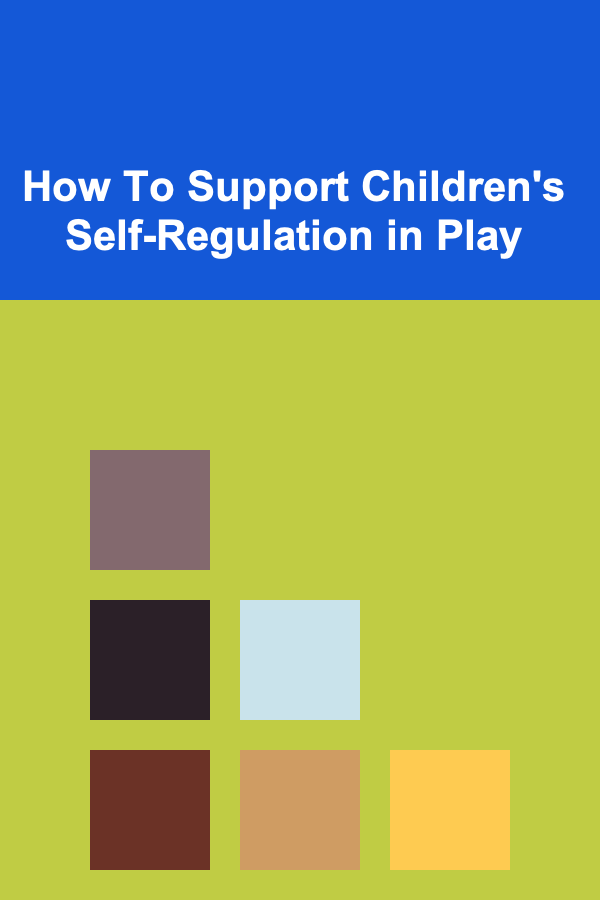
How To Support Children's Self-Regulation in Play
ebook include PDF & Audio bundle (Micro Guide)
$12.99$6.99
Limited Time Offer! Order within the next:

Self-regulation is a crucial developmental skill that significantly contributes to a child's emotional, cognitive, and social well-being. It refers to the ability to control one's emotions, behaviors, and thoughts in the face of temptations and impulses, and it plays a vital role in learning, development, and overall life success. Self-regulation in play is particularly important because play is one of the primary ways children learn to navigate their emotions, interact with others, and solve problems.
In this article, we will explore how adults, including parents, caregivers, and educators, can support children's self-regulation during play. We will delve into the concept of self-regulation, discuss the benefits of fostering it, and provide practical strategies for adults to guide children toward mastering self-regulation during their playtime. Additionally, we will explore how different types of play contribute to developing self-regulation and why it is essential for a child's emotional and social development.
Understanding Self-Regulation in Children
Before diving into ways to support self-regulation, it's essential to understand what self-regulation is and why it is so crucial for children's development.
What Is Self-Regulation?
Self-regulation is the ability to manage one's emotions, behaviors, and thoughts in different situations. It involves skills such as impulse control, emotional awareness, self-discipline, and goal setting. It allows individuals to respond to situations with appropriate actions, rather than reacting impulsively.
For children, self-regulation develops gradually over time. Young children, especially toddlers, often struggle with controlling their emotions and actions. As they grow and experience more social and environmental interactions, they start to gain better control over their responses. Self-regulation involves both physiological control (e.g., calming down when upset) and cognitive control (e.g., resisting distractions to focus on a task).
Why Is Self-Regulation Important for Children?
Self-regulation is a key factor in several developmental areas:
- Cognitive Development: Self-regulation supports cognitive functions like attention, problem-solving, and memory. It enables children to concentrate, think ahead, and avoid distractions.
- Social Skills: Children with strong self-regulation skills are better able to interact with others in positive ways. They can share, take turns, express their emotions in healthy ways, and manage conflicts.
- Emotional Well-being: Developing self-regulation helps children manage stress and frustration, reducing the likelihood of emotional outbursts.
- Academic Success: Research shows that children who possess strong self-regulation skills tend to perform better academically, as they can focus, control impulses, and persist through challenges.
The Role of Play in Developing Self-Regulation
Play is one of the most effective ways for children to develop self-regulation. During play, children encounter various scenarios where they need to manage their emotions, control their actions, follow rules, and cooperate with peers. Play allows children to practice these skills in a safe and supportive environment.
There are several types of play that are particularly beneficial for promoting self-regulation:
- Structured Play: This includes activities with clear rules, such as board games, puzzles, or sports. These activities help children practice impulse control and turn-taking while learning to follow instructions.
- Unstructured Play: Free play, like imaginative play, allows children to use their creativity and practice emotional regulation as they navigate social situations and express their feelings.
- Physical Play: Activities like running, climbing, or dancing help children regulate their energy and emotions while also improving physical coordination.
- Role-Playing Play: Pretend play encourages children to explore different perspectives, practice empathy, and regulate their emotional responses in social scenarios.
The Benefits of Supporting Self-Regulation Through Play
Supporting self-regulation during play has several long-term benefits for children, including:
- Improved Emotional Control: By navigating emotions during play, children learn to calm themselves down, manage frustration, and express emotions constructively.
- Better Conflict Resolution: Play often involves social interactions where disagreements may arise. Supporting children in resolving conflicts respectfully teaches them how to manage differences and practice patience.
- Increased Focus and Attention: Play can help children practice staying focused on tasks, whether it's completing a puzzle or working through a game.
- Enhanced Social Relationships: When children learn self-regulation, they are better able to communicate with peers, share, and cooperate during group play, fostering positive social relationships.
Strategies to Support Self-Regulation in Play
Now that we understand the importance of self-regulation and its connection to play, let's explore practical strategies that adults can use to support children's self-regulation during play.
1. Set Clear Expectations and Rules
Children thrive in environments where they know what is expected of them. During play, establishing clear rules can help children understand the boundaries and develop self-regulation skills. Clear expectations also make it easier for children to regulate their behavior, as they know what is acceptable and what is not.
Practical Tips:
- Establish simple and age-appropriate rules before the play begins, such as "Take turns," "Use kind words," and "Share the toys."
- Be consistent in enforcing the rules. When children break the rules, calmly explain what they did wrong and how they can fix it next time.
- Provide gentle reminders of the rules as play progresses, reinforcing good behavior.
2. Model Self-Regulation
Children learn by observing adults. Therefore, modeling self-regulation is one of the most effective ways to teach it. By demonstrating how to regulate emotions, stay calm in stressful situations, and solve problems constructively, adults can help children understand the importance of self-regulation.
Practical Tips:
- Stay calm when faced with challenging situations. If something goes wrong during play, demonstrate how to stay composed, express feelings appropriately, and resolve issues.
- Verbalize your own self-regulation strategies. For example, "I'm feeling frustrated right now, so I'm going to take a deep breath to calm down."
- Acknowledge your own mistakes and show children how to handle them calmly.
3. Provide Opportunities for Independent Problem-Solving
Allowing children to work through problems on their own during playtime encourages them to use self-regulation skills. When they face challenges, they must decide how to respond in a controlled manner, whether that means resolving conflicts with peers, figuring out how to complete a task, or managing their emotions.
Practical Tips:
- Offer age-appropriate activities that encourage problem-solving, such as puzzles or building toys.
- Encourage children to think through their options before acting, using questions like "What could we do if we can't agree?" or "How can we fix this problem?"
- Step back and give children time to solve problems independently before stepping in to assist.
4. Use Positive Reinforcement
Reinforcing good behavior encourages children to continue practicing self-regulation. When children successfully manage their emotions, follow the rules, or cooperate with peers, praise their efforts. Positive reinforcement boosts their confidence and motivates them to keep developing their self-regulation skills.
Practical Tips:
- Praise children when they handle frustration calmly or make a good decision during play, such as sharing a toy or taking turns.
- Provide specific and sincere feedback, such as "I'm proud of you for taking deep breaths when you felt upset."
- Use rewards that encourage self-regulation, such as extra playtime or a special treat, when appropriate.
5. Encourage Reflection and Self-Awareness
Helping children reflect on their behavior during or after play encourages self-awareness and emotional regulation. By talking about how they felt during a game or activity, children learn to recognize their emotions and understand how their actions impact others.
Practical Tips:
- After playtime, ask open-ended questions such as "How did you feel when you couldn't win?" or "What did you do when you got frustrated?"
- Encourage children to express their feelings and guide them to reflect on how they managed their emotions.
- Use storytelling or books about emotions to help children understand different feelings and how to regulate them.
6. Create a Safe and Supportive Play Environment
A positive, safe environment where children feel comfortable expressing themselves is essential for self-regulation. When children feel secure, they are more likely to take risks, explore, and regulate their emotions during play.
Practical Tips:
- Ensure that the play environment is physically safe and emotionally supportive, with enough space for children to move and explore.
- Foster a calm atmosphere by minimizing distractions and maintaining a peaceful tone of voice during play.
- Encourage cooperative and non-competitive play to reduce stress and frustration during interactions.
7. Encourage Emotional Vocabulary
One of the challenges children face when regulating their emotions is that they may not have the words to express how they feel. Encouraging emotional vocabulary can help children label and understand their emotions, leading to better self-regulation.
Practical Tips:
- Teach children names for different emotions, such as "happy," "angry," "frustrated," and "excited."
- Use books, songs, or games that explore different emotions and how to manage them.
- Encourage children to express how they are feeling using their emotional vocabulary, helping them develop the language to regulate their emotions effectively.
Conclusion
Supporting children's self-regulation during play is essential for their emotional, cognitive, and social development. By providing clear expectations, modeling self-regulation, encouraging problem-solving, and creating a safe environment, adults can foster an atmosphere that helps children learn to manage their emotions, behavior, and interactions with others. As children develop these skills, they will gain the confidence and tools they need to navigate the challenges of life and become successful, empathetic, and emotionally intelligent individuals.
Self-regulation is not a skill that develops overnight; it requires practice, patience, and consistency. By supporting children's self-regulation through play, adults provide them with the foundation to thrive both in and out of the play environment.

How to Create a Simple Yet Effective Cleaning Caddy
Read More
How to Implement a Paperless Office System
Read More
How to Make Money Online as a Podcast Editor: 10 Actionable Ideas
Read More
How to Organize Your Entryway for Maximum Space Efficiency
Read More
How to Set Realistic Financial Goals Before Investing
Read More
How to Use Deep Learning to Profit from Data Science Projects
Read MoreOther Products

How to Create a Simple Yet Effective Cleaning Caddy
Read More
How to Implement a Paperless Office System
Read More
How to Make Money Online as a Podcast Editor: 10 Actionable Ideas
Read More
How to Organize Your Entryway for Maximum Space Efficiency
Read More
How to Set Realistic Financial Goals Before Investing
Read More